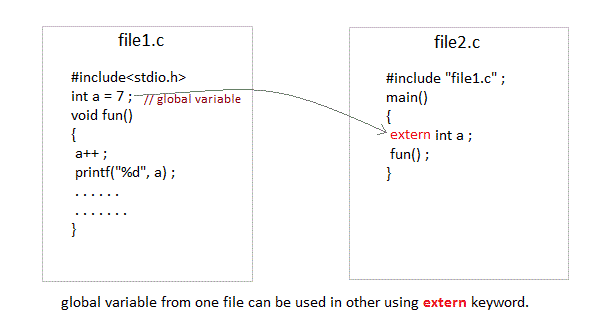In C language, each variable has a storage class which decides scope, visibility and lifetime of that variable. The following storage classes are most oftenly used in C programming,
A variable declared inside a function without any storage class specification, is by default an automatic variable. They are created when a function is called and are destroyed automatically when the function exits. Automatic variables can also be called local variables because they are local to a function. By default they are assigned garbage value by the compiler.
void main()
{
int detail;
or
auto int detail; //Both are same
}
A variable that is declared outside any function is a Global variable. Global variables remain available throughout the entire program. One important thing to remember about global variable is that their values can be changed by any function in the program.
int number;
void main()
{
number = 10;
}
function1()
{
number = 20;
}
function2()
{
number = 30;
}Here the global variable number is available to all three functions.
The extern keyword is used before a variable to inform the compiler that this variable is declared somewhere else. The extern declaration does not allocate storage for variables.

main()
{
a = 10; /*Error:cannot find variable a*/
printf("%d",a);
}
main()
{
extern int x; /*Tells compiler that it is defined somewhere else*/
x = 10;
printf("%d",x);
}
int x; //Global variable xA static variable tells the compiler to persist the variable until the end of program.
Instead of creating and destroying a variable every time when it comes into and goes out of scope, static is initialized only once and remains into existence till the end of program.
A static variable can either be internal or external depending upon the place of declaration.
Scope of internal static variable remains inside the function in which it is defined. External static variables remain restricted to scope of file in each they are declared.
They are assigned 0 (zero) as default value by the compiler.
void test(); /*Function declaration (discussed in next topic)*/
main()
{
test();
test();
test();
}
void test()
{
static int a = 0; /*Static variable*/
a = a + 1;
printf("%d ",a);
}Register variable inform the compiler to store the variable in register instead of memory.
Register variable has faster access than normal variable.
Frequently used variables are kept in register. Only few variables can be placed inside register.
NOTE : We can never get the address of such variables.
register int number;
Ask Question